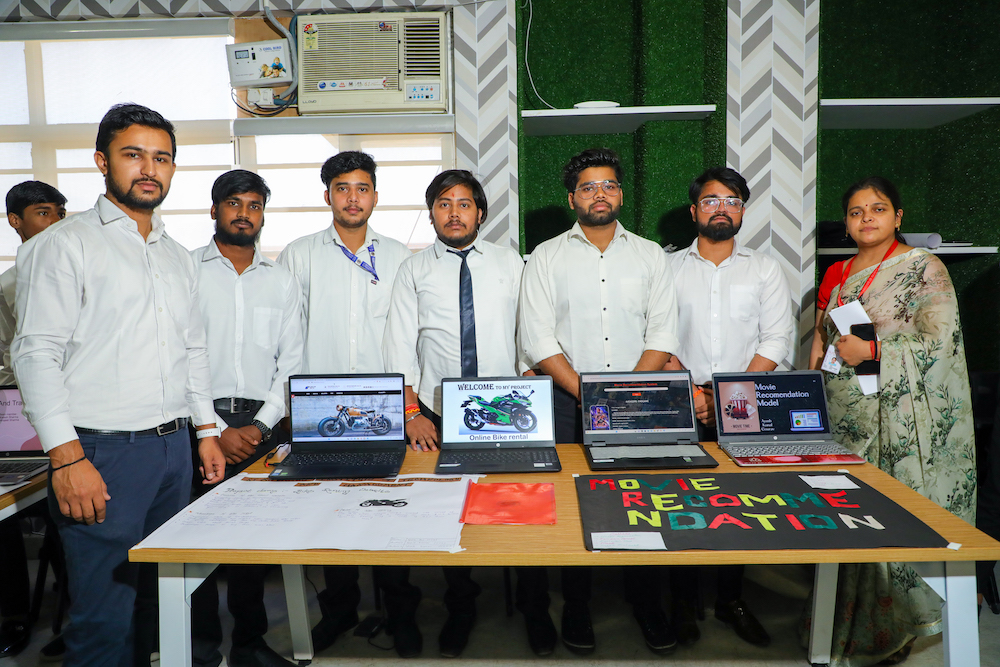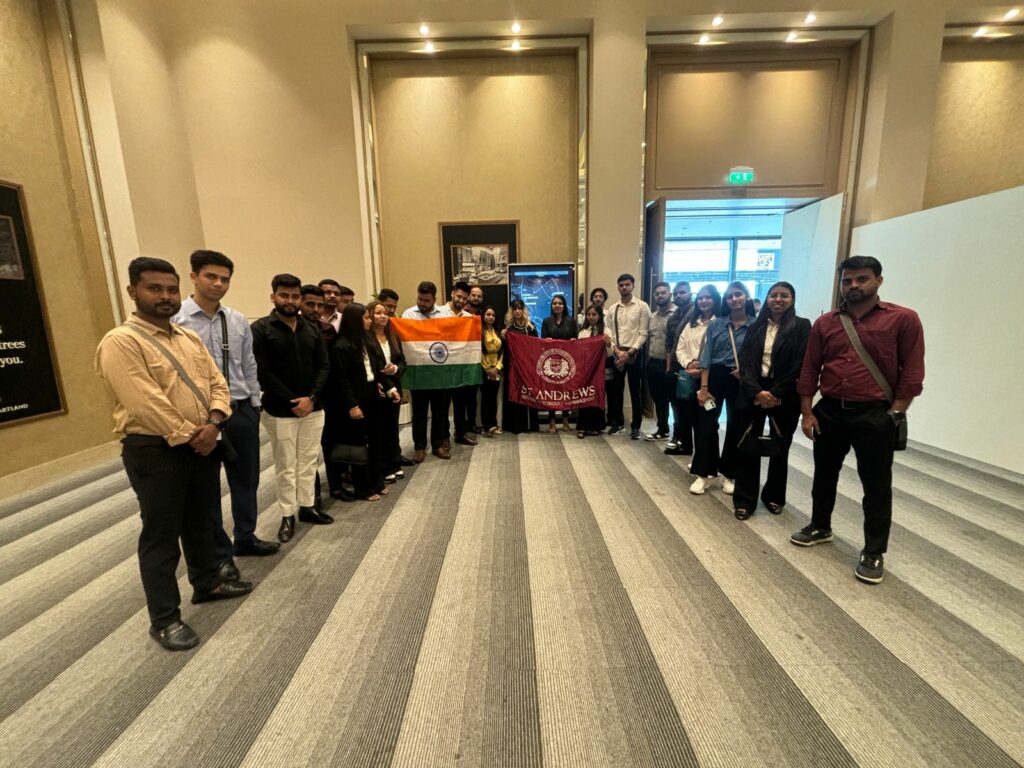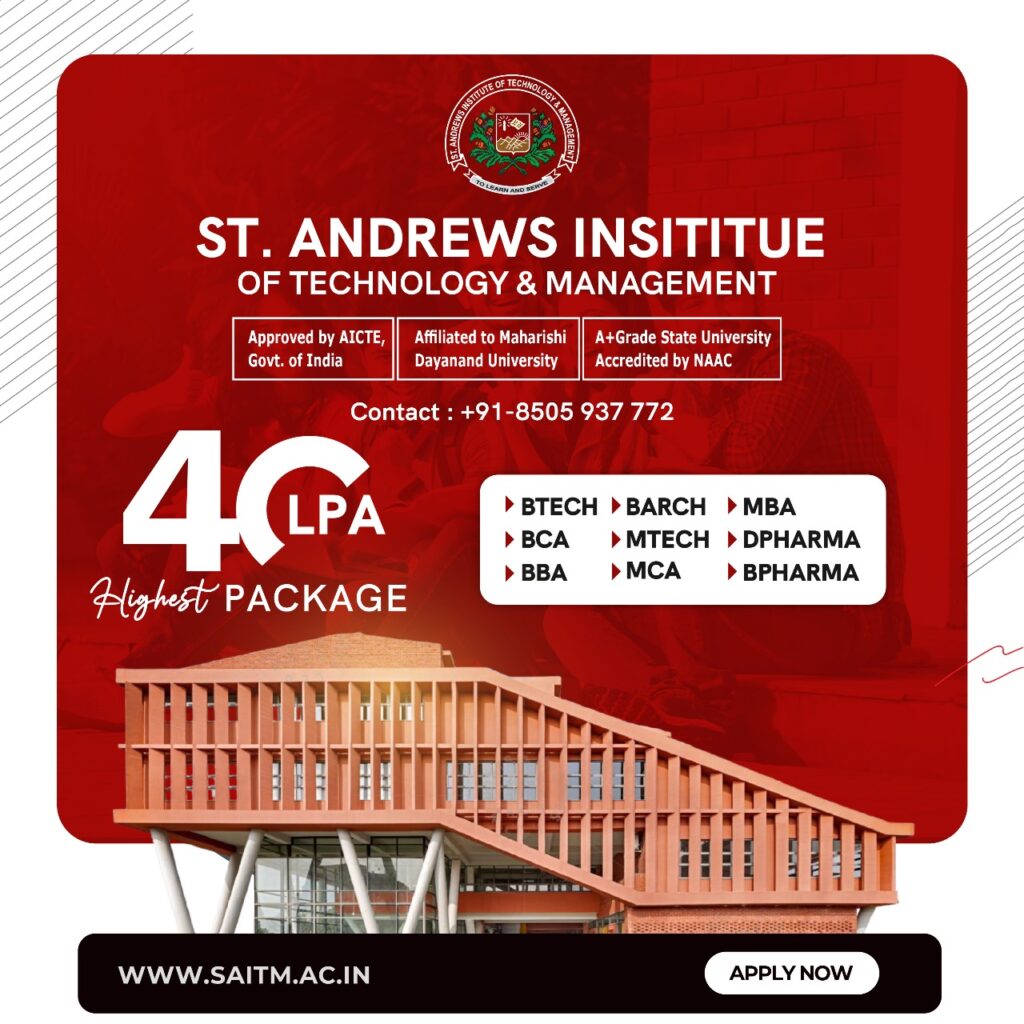Job Scope after BCA
The job scope after BCA is vast and promising, catering to the growing demand for skilled IT professionals in various industries.
Graduates can pursue careers as software developers, system analysts, web developers, and database administrators, where they design, develop, and maintain software applications and systems.
Additionally, roles such as network administrators, IT support specialists, and cybersecurity experts are in high demand, ensuring the smooth operation and security of computer networks and data.
The expanding fields of data science, artificial intelligence, and machine learning offer opportunities for BCA graduates to work as data analysts, AI specialists, and machine learning engineers.
Furthermore, the entrepreneurial path is also viable, with many BCA graduates launching their own tech startups or freelancing in web development and digital marketing.
The continuous evolution of technology guarantees diverse and dynamic career prospects for BCA graduates. The job scope after BCA is vast, making it a rewarding field with ample opportunities for growth and advancement.
Some of the most opted courses in India and St. Andrews college or different Engineering college or Management colleges are as follows:-
- Btech
- Btech CSE
- Btech ETCE
- MTech
- BCA
- BBA
- MBA
- MCA
- DPharma – St. Andrews College of Pharmacy
- BPharma – St. Andrews College of Pharmacy
- BArch – St. Andrews College of Architecture
Job Scope After Completing a BCA Course

Here is an in-depth look at the job scope after completing a BCA:
Software Engineer
Software developers are responsible for designing, developing, testing, and maintaining software applications. They work on a range of projects, from desktop applications to mobile apps and large-scale enterprise software. The job scope after BCA includes proficiency in coding languages such as Java, C++, Python, and frameworks like .NET, which is crucial for success. BCA students often start as junior developers and can progress to roles such as senior developer, team lead, and software architect.
Web Developer
Web developers and web designers specialize in creating and maintaining websites and web applications. They work with technologies like HTML, CSS, JavaScript, and various web development frameworks such as Angular, React, and Vue.js. This role involves both front-end and back-end development, and there is a high demand for skilled web developers and web designers in both freelance and corporate environments.
System Analyst
System analysts bridge the gap between business needs and IT solutions. They analyze and design information systems, ensuring they align with business objectives. This role requires strong analytical skills, a good understanding of business processes, and the ability to communicate effectively with both technical teams and stakeholders.
Database Administrator
Database administrators (DBAs) are responsible for managing and maintaining databases to ensure data integrity, security, and availability. They use SQL and DBMS like Oracle, MySQL, and Microsoft SQL Server. DBAs play a critical role in optimizing database performance and managing data backups and recovery.
Network Administrator
Network administrators manage and maintain an organization’s digital platforms and computer networks. Their responsibilities include configuring network hardware, implementing security measures, and troubleshooting network issues. This role requires knowledge of networking protocols, firewall management, and experience with network configuration tools.
Cyber Security Expert
With the rise in cyber threats, the demand for cybersecurity experts has surged. These professionals protect systems and networks from cyber-attacks, unauthorized access, and data breaches. Skills in ethical hacking, penetration testing, and knowledge of security protocols are essential for this role. Cybersecurity experts can work for IT security firms, large corporations, or as independent consultants.
IT Support Specialist
IT support specialists provide technical assistance to users experiencing IT-related issues. They troubleshoot problems, provide solutions, and ensure that IT systems run smoothly. This role is essential in all organizations that rely on computer systems and technology. Strong problem-solving skills and customer service orientation are key to success in this role.
Digital Marketer
Digital marketers use digital channels to promote products and services. They employ strategies such as search engine optimization (SEO), search engine marketing (SEM), content marketing, and social media marketing. A BCA degree, combined with knowledge of digital marketing tools and techniques, can pave the way for a successful future in this field.
Data Scientists
Data scientists analyze and interpret complex data to help organizations make informed decisions. They use statistical techniques, data visualization, and coding languages like R and Python. Data science is a rapidly growing field with applications in various industries, including finance, healthcare, and e-commerce.
Mobile App Developer
Mobile app developers create applications for smartphones and tablets. They work with platforms like iOS and Android, using development frameworks such as React Native, Flutter, and Swift. The increasing use of mobile devices has led to a high demand for skilled app developers.
Project Manager
Project managers oversee IT projects from inception to completion. They ensure projects are completed on time, within budget, and meet the specified requirements. This role requires strong leadership, communication, and organizational skills, along with a good understanding of project management methodologies like Agile and Scrum.
Tech Entrepreneur
For those with an entrepreneurial spirit, a BCA degree provides the technical knowledge needed to start and run a tech company. This path requires innovation, business acumen, and the ability to navigate the challenges of entrepreneurship.
BCA Course Overview

The BCA course is an undergraduate program in computer application, usually lasting three to four years, depending on the institution and the country’s educational framework. The job scope after BCA is broad, providing numerous opportunities in the IT sector and related fields.
It focuses on various aspects of computer application, including software design, computer programming languages, DBMS, computer network, web designing, and computer application in business.
The curriculum of a BCA (Bachelor of Computer Application) program usually includes both theoretical knowledge and practical skills. Students may learn programming languages like C, C++, Java, Python, and others, as well as DBMS such as SQL. Additionally, they might study topics like computer architecture, operating systems, data structures, algorithms, software engineering principles, and computer networking.
BCA degree often incorporate hands-on projects, internships, and practical training to give students real-world experience and prepare them for careers in the field of information technology. When choosing a BCA college, consider factors such as fees, eligibility criteria, practical aspects, job readiness, industry-relevant curriculum, and placement support.
Graduates of BCA degree can pursue various career paths, including web designing, database administration, systems analysis, network administration, IT consulting, and more.
Additionally, some students may choose to pursue further education by enrolling in master’s programs like Master of Computer Application (MCA) or related fields. A master’s degree is crucial for career advancement in sectors driven by big data, technology, and information, opening up roles such as systems engineer, computer programmer, network administrator, web developer, and web designer.
Top Career Opportunities After BCA

A Bachelor of Computer Application (BCA) degree opens doors to a variety of exciting career paths in the information technology (IT) sector.
Here are some of the top career options after BCA for a BCA graduate:
Software Engineer-
Role: Design, develop, test, and maintain software applications.
Skills Required: Proficiency in programming languages such as Java, C++, Python, and frameworks like .NET.
Career Path: Junior Developer -> Senior Developer -> Team Lead -> Software Architect.
Web Developer:
Role: Create and maintain websites and web applications.
Skills Required: HTML, CSS, JavaScript, and frameworks like Angular, React, and Vue.js.
Career Path: Front-End Developer -> Full-Stack Developer -> Web Designing Manager.
System Analyst:
Role: Analyze and design IT solutions to meet business needs.
Skills Required: Strong analytical skills, understanding of business processes, and good communication.
Career Path: System Analyst -> Senior System Analyst -> IT Consultant.
Database Administrator (DBA)
Role: Manage and maintain databases to ensure data integrity, security, and availability.
Skills Required: SQL, Oracle, MySQL, and DBMS.
Career Path: Junior DBA -> Senior DBA -> Database Architect.
Network Administrator:
Role: Manage and maintain an organization’s computer networks.
Skills Required: Networking protocols, firewall management, and network configuration tools.
Career Path: Network Technician -> Network Administrator -> Network Manager.
Cybersecurity Expert
Role: Protect systems and networks from cyber threats and vulnerabilities.
Skills Required: Ethical hacking, penetration testing, knowledge of security protocols.
Career Path: Cybersecurity Analyst -> Cybersecurity Consultant -> Chief Information Security Officer (CISO).
IT Support Specialist–
Role: Provide technical support and troubleshoot IT issues for users.
Skills Required: Problem-solving, customer service, knowledge of various IT systems.
Career Path: IT Support Technician -> IT Support Specialist -> IT Support Manager.
Digital Marketer–
Role: Use digital channels to promote products and services.
Skills Required: SEO, SEM, content marketing, social media marketing.
Career Path: Digital Marketing Executive -> Digital Marketing Manager -> Digital Marketing Director.
Data Scientists:
Role: Analyze and interpret complex data to help organizations make informed decisions.
Skills Required: Statistical analysis, data presentation, proficiency in R and Python.
Career Path: Data Analyst -> Data Scientist -> Lead Data Scientist.
Mobile App Developer–
Role: Develop applications for mobile devices (iOS, Android).
Skills Required: Mobile development frameworks like React Native, Flutter, Swift.
Career Path: Junior App Developer -> Senior App Developer -> Mobile App Development Manager.
Project Manager:
Role: Oversee IT projects from inception to completion, ensuring they meet deadlines and budgets.
Skills Required: Leadership, communication, understanding of project management methodologies like Agile and Scrum.
Career Path: Project Coordinator -> Project Manager -> Program Manager.
Tech Entrepreneur:
Role: Start and run a tech company or business.
Skills Required: Business acumen, innovation, technical knowledge.
Career Path: Entrepreneur -> Startup Founder -> CEO.
Game Developer
Role: Design and develop video games for various platforms.
Skills Required: Game design, programming (Unity, Unreal Engine), creativity.
Career Path: Junior Game Developer -> Senior Game Developer -> Lead Game Designer.
Higher Studies Options After BCA

Pursuing a master’s degree, especially in fields like Data Science or Computer Applications, can significantly enhance career prospects in sectors driven by big data, technology, and information.
After completing a Bachelor of Computer Application (BCA) degree, there are several higher studies options available for further career advancement and specialization. The job scope after BCA can be expanded by pursuing advanced degrees such as MCA, MBA in IT, or specialized certifications in areas like data science, cybersecurity, and software development.
Here are some popular choices for higher studies:
Master of Computer Applications (MCA):
Pursuing an MCA degree provides in-depth knowledge and specialization in various areas of computer science.
MCA programs typically cover advanced topics such as software engineering, DBMS, artificial intelligence, and computer networks.
Graduates with an MCA degree have opportunities for higher-level positions in software development, systems analysis, project coordination, and more.
Master of Science (MS) in Computer Science:
An MS in Computer Science offers advanced study in computer science theory, algorithms, and research methods.
Students can specialize in areas such as artificial intelligence, machine learning, data science, cybersecurity, or computer graphics.
This degree is valuable for those interested in pursuing careers in research, academia, or specialized technical roles in industry.
Master of Business Administration (MBA) with Specialization in Information Technology (IT):
Combining an MBA (Master of Business Administration) with a focus on IT provides a strong foundation in both business management and technology.
Students learn strategic planning, leadership, project coordination, and business analysis skills specific to the IT sector.
This degree opens up BCA job opportunities for management and leadership roles in IT companies, consulting firms, and tech startups.
Postgraduate Diploma in Computer Applications (PGDCA):
A PGDCA program offers specialized training in advanced topics related to computer application and IT.
It provides practical skills and knowledge in areas such as software development, networking, and web technologies.
PGDCA programs are typically shorter in duration compared to master’s degrees and focus more on practical applications of technology.
Master of Technology (M.Tech) in Computer Science and Engineering:
M.Tech programs offer advanced study in specialized areas of computer science and engineering.
Students can choose from a wide range of specializations such as computer networks, cybersecurity, software engineering, and data analytics.
This degree is suitable for those interested in pursuing careers in research, development, or academia.
Professional Certifications:
Various professional certifications are available in specific areas of IT, such as programming languages, cloud computing, cybersecurity, and project coordination.
Certifications from organizations like Cisco, Microsoft, CompTIA, AWS, and PMI are highly valued in the industry and can enhance career prospects.
Professionals can pursue certifications alongside or after completing their BCA degree to validate their skills and knowledge in specific technology domains.
Popular Job Roles for BCA Graduates

A Bachelor of Computer Application (BCA) degree is a gateway to a multitude of career opportunities in the dynamic and rapidly evolving field of information technology (IT). The job scope after BCA is extensive, as BCA students possess a diverse skill set encompassing programming languages, web designing, networking, and more, making them highly sought after by employers across various industries.
Let’s delve into some of the popular job roles that a BCA graduate can pursue:
Software Engineer:
Role: Software developers are responsible for designing, developing, testing, and maintaining software applications. They work with programming languages such as Java, C++, Python, and frameworks like .NET to create efficient and user-friendly solutions. From developing desktop applications to mobile apps and enterprise software, software developers play a crucial role in driving innovation and technological advancement.
Career Path: A BCA graduate typically start as junior developers, gaining experience and expertise as he/she progress to roles such as senior developer, team lead, and eventually, software architect. With continuous learning and skill enhancement, they can advance their careers and take on more challenging projects and leadership roles.
Web Developer-
Role: Web developers specialize in creating and maintaining websites and web applications. They work with technologies like HTML, CSS, JavaScript, and frameworks such as Angular, React, and Vue.js to build interactive and responsive web experiences. Web developers collaborate with designers and content creators to bring website designs to life and ensure seamless functionality across different browsers and devices.
Career Path: BCA Students with a knack for front-end development may start as junior web developers, honing their skills in HTML, CSS, and JavaScript. As they gain experience, they can transition to full-stack development roles, where they work on both front-end and back-end components of web applications. With expertise in web designing frameworks and project coordination, they may advance to roles such as web designing manager or technical lead.
System Analyst-
Role: System analysts bridge the gap between business needs and IT solutions. They analyze user requirements, design information systems, and recommend technological solutions to improve efficiency and productivity. System analysts possess strong analytical skills, a good understanding of business processes, and the ability to communicate effectively with stakeholders and technical teams.
Career Path: BCA students may start as junior system analysts, assisting in requirements gathering and system design activities. With experience and domain knowledge, they can progress to roles such as senior system analyst or IT consultant, where they lead complex projects and provide strategic guidance to organizations in leveraging technology for business growth.
Database Administrator (DBA):
Role: Database administrators (DBAs) are responsible for managing and maintaining databases to ensure data integrity, security, and availability. They design database structures, optimize performance, and implement security measures to protect sensitive information. DBAs work with SQL and DBMS like Oracle, MySQL, and Microsoft SQL Server to handle large volumes of data efficiently.
Career Path: BCA students with a knack for data management may start as junior DBAs, assisting in database maintenance and troubleshooting tasks. As they gain experience and expertise in database technologies, they can advance to roles such as senior DBA or database architect, where they design and implement robust database solutions to meet organizational needs.
Network Administrator-
Role: Network administrators are responsible for managing and maintaining an organization’s computer networks. They configure network hardware, implement security measures, and troubleshoot network issues to ensure smooth and secure communication between devices. Network administrators work with networking protocols, firewall management, and network configuration tools to optimize network performance.
Career Path: BCA students interested in network management may start as network technicians, gaining hands-on experience in network setup and maintenance. With specialized training and certifications in networking technologies, they can advance to roles such as network administrator or network manager, where they oversee the design and operation of complex network infrastructures.
Cybersecurity Analyst:
Role: With the rise in cyber threats, cybersecurity analysts play a crucial role in protecting systems and networks from cyber-attacks and data breaches. They conduct security assessments, implement security measures, and respond to security incidents to safeguard sensitive information. Cybersecurity analysts possess expertise in ethical hacking, penetration testing, and knowledge of security protocols.
Career Path: BCA students with a passion for cybersecurity may start as cybersecurity analysts, working closely with IT teams to identify and mitigate security vulnerabilities. With specialized training and certifications in cybersecurity, they can advance to roles such as cybersecurity consultant or chief information security officer (CISO), where they lead cybersecurity initiatives and ensure compliance with regulatory requirements.
IT Support Specialist:
Role: IT support specialists provide technical assistance to users experiencing IT-related issues. They troubleshoot problems, provide solutions, and ensure that IT systems run smoothly to minimize downtime and disruptions. IT support specialists possess strong problem-solving skills, customer service orientation, and knowledge of various IT systems and applications.
Career Path: BCA graduates with a knack for customer support may start as IT support technicians, providing frontline assistance to users. With experience and certifications in IT support, they can advance to roles such as IT support specialist or IT support manager, where they oversee helpdesk operations and provide technical guidance to support teams.
Digital Marketer:
Role: Digital marketers use digital channels to promote products and services, engage with customers, and drive business growth. They employ strategies such as search engine optimization (SEO), search engine marketing (SEM), content marketing, and social media marketing to reach target audiences and achieve marketing objectives. Digital marketers possess expertise in digital analytics tools, marketing automation platforms, and campaign optimization techniques.
Career Path: BCA students with a flair for marketing may start as digital marketing executives, assisting in campaign execution and performance analysis. With specialized training and certifications in digital marketing course, they can advance to roles such as digital marketing manager or digital marketing director, where they develop and implement comprehensive digital marketing strategies to achieve business goals.
Data Analyst:
Role: Data analysts analyze and interpret data to provide insights for decision-making and business optimization. They collect, clean, and transform data, perform statistical analysis, and create visualizations to communicate findings effectively. Data analysts work with tools like Excel, SQL, R, and Python to extract valuable insights from structured and unstructured data sources.
Career Path: BCA graduates with a knack for data analysis may start as data analysts, assisting in data collection and analysis tasks. With specialized training in data analytics and visualization tools, they can advance to roles such as business analyst or data scientist, where they lead data-driven initiatives and contribute to organizational growth through data-driven decision-making.
Mobile App Developer:
Role: Mobile app developers design and develop applications for mobile devices, such as smartphones and tablets. They work with mobile development frameworks like React Native, Flutter, and Swift to create intuitive and engaging mobile experiences for users. Mobile app developers possess expertise in mobile UI/UX design, cross-platform development, and app deployment.
Career Path: BCA students with a passion for mobile technology may start as junior app developers, gaining experience in mobile app development frameworks and platforms. With specialized training and certifications in mobile app development, they can advance to roles such as senior app developer or mobile app development manager, where they lead mobile app projects and drive innovation in mobile technology.
Top Companies Hiring BCA Graduates

BCA students are highly valued by a wide range of companies operating in various industries. The job scope after BCA is particularly strong in the information technology (IT) sector, where their skills are in high demand.
Here are some top companies known for hiring BCA students:
TCS (Tata Consultancy Services)
TCS is one of the largest IT services and consulting companies globally, offering a wide range of services including software developing, consulting, and business solutions.
Known for its extensive recruitment drives and training programs, TCS often hires BCA students for roles such as software engineer, system analyst, and IT support specialist.
Infosys
Infosys is a multinational IT services company that provides consulting, technology, and outsourcing services to clients across various industries.
With its focus on innovation and technology-driven solutions, Infosys offers opportunities for BCA students in software developing, testing, and IT consulting roles.
Wipro
Wipro is a leading global IT consulting and business process services company known for its expertise in digital transformation, cloud computing, and cybersecurity.
BCA students can find opportunities as software engineer, database administrator, and IT support roles at Wipro, along with opportunities for career growth and skill development.
Accenture
Accenture is a multinational professional services company providing strategy, consulting, digital, technology, and operations services.
Known for its diverse range of projects and global presence, Accenture offers opportunities for BCA graduates as software engineer, system analyst, and digital marketing roles.
IBM (International Business Machines Corporation)
IBM is a multinational technology company that offers hardware, software, and cloud-based services across various industries.
BCA graduates can explore opportunities at IBM as software engineer, data analytics, cybersecurity, and IT consulting, leveraging the company’s cutting-edge technologies and solutions.
Capgemini
Capgemini is a global leader in consulting, technology services, and digital transformation, with a focus on innovation and sustainability.
BCA graduates can find opportunities at Capgemini as software developer, tester, cybersecurity, and project coordination roles, contributing to the company’s diverse portfolio of projects and solutions.
Cognizant
Cognizant is a multinational IT services company that provides consulting, technology, and outsourcing services to clients worldwide.
With its focus on digital transformation and technology-driven solutions, Cognizant offers opportunities for BCA graduates as software developer, system analysis, and IT consulting roles.
HCL Technologies
HCL Technologies is a leading global IT services company that provides software-led IT solutions, remote infrastructure management, engineering, and R&D services.
BCA graduates can explore opportunities at HCL Technologies in software development, system administration, and IT support roles, contributing to the company’s innovative projects and solutions.
Tech Mahindra
Tech Mahindra is a multinational IT services company that specializes in digital transformation, consulting, and business process outsourcing services.
BCA graduates can find opportunities at Tech Mahindra in software development, network administration, and IT support roles, leveraging the company’s expertise in emerging technologies and digital solutions.
Amazon
Amazon is a multinational technology company that focuses on e-commerce, cloud computing, digital streaming, and artificial intelligence.
BCA graduates can explore opportunities at Amazon in software development, data analytics, cloud computing, and digital marketing roles, contributing to the company’s innovative projects and solutions.
Skills Required for a Successful Career After BCA

A successful career after completing a Bachelor of Computer Application (BCA) requires a combination of technical proficiency, soft skills, and a continuous commitment to learning and professional development.
Here are some essential skills that can contribute to a successful future path for BCA graduates:
Programming Languages:
Proficiency in programming languages such as Java, C++, Python, and others is fundamental for software development roles.
Ability to write clean, efficient, and maintainable code is essential for building robust software applications.
Web Designing:
Knowledge of HTML, CSS, and JavaScript, along with frameworks like Angular, React, or Vue.js, is crucial for web designing roles.
Understanding of front-end and back-end development principles and experience with web designing tools and technologies are valuable assets.
Database Management:
Familiarity with database management systems (DBMS) such as Oracle, MySQL, or Microsoft SQL Server is essential for database administration and development roles.
Skills in SQL query writing, database design, optimization, and maintenance are critical for managing large volumes of data effectively.
Problem-Solving Skills:
Strong problem-solving abilities are essential for troubleshooting technical issues, debugging code, and resolving system errors.
Analytical thinking and attention to detail are valuable traits for identifying and addressing complex problems in software development and IT operations.
Communication Skills:
Effective communication skills, both verbal and written, are crucial for collaborating with team members, interacting with clients, and presenting technical concepts to non-technical stakeholders.
Clear and concise communication helps in conveying ideas, gathering requirements, and facilitating productive discussions within the team.
Teamwork and Collaboration:
Ability to work effectively in a team environment, collaborate with cross-functional teams, and contribute to collective goals is essential for success in IT projects.
Strong interpersonal skills, empathy, and a positive attitude foster collaboration and create a supportive work culture.
Adaptability and Learning Agility:
The IT industry is constantly evolving, so adaptability and a willingness to learn new technologies and skills are essential for staying relevant and competitive.
Embracing change, seeking out opportunities for growth, and continuously upgrading one’s knowledge base are key to long-term success in the IT field.
Time Management and Organization:
Effective time management skills, prioritization, and organization are essential for meeting project deadlines, managing multiple tasks simultaneously, and balancing workloads.
Utilizing project coordination tools, setting realistic goals, and maintaining focus on high-priority tasks help in optimizing productivity and achieving career objectives.
Customer Focus:
A customer-centric mindset, along with empathy and a deep understanding of end-user needs, is critical for delivering solutions that meet client expectations and enhance user experience.
Listening to customer feedback, soliciting input, and proactively addressing concerns contribute to building strong relationships and fostering client satisfaction.
Average Salary Expectations for BCA Graduates

The average salary expected after completing a Bachelor of Computer Application (BCA) course in India can vary depending on several factors such as the job role, employer, location, skills, and level of experience. The job scope after BCA significantly influences these salary variations, offering diverse opportunities across different sectors.
Here’s a general overview of the salary expectations for BCA graduates in entry-level positions across various roles:
Software Developer/Engineer
Entry-level software developers focus on software development and they can expect an average salary ranging from ₹3 lakh to ₹6 lakh anually. Salaries may vary based on the employer, technology stack, and location.
Web Developer—
Entry-level web developers can expect an average salary ranging from ₹2.5 lakh to ₹5 lakh anually. Salaries may vary based on proficiency in front-end or back-end development, experience level, and geographic location.
Database Administrator (DBA)–
Entry-level database administrators can expect an average salary ranging from ₹3 lakh to ₹6 lakh anually. Salaries may vary based on the type of database systems managed and the organization’s size and industry.
Network Administrator/Engineer
Entry-level network administrators or engineers can expect an average salary ranging from ₹2.5 lakh to ₹5 lakh anually. Salaries may vary based on the complexity of the network infrastructure and industry demand.
Systems Analyst
Entry-level systems analysts can expect an average salary ranging from ₹3 lakh to ₹6 lakh anually. Salaries may vary based on the industry domain, analytical skills, and experience with system analysis methodologies.
IT Consultant
Entry-level IT consultants can expect an average annual salary ranging from ₹3 lakh to ₹6 lakh. Salaries may vary based on the consulting firm, specialization area, and client engagements.
Quality Assurance (QA) Analyst/Tester
Entry-level QA analysts or testers can expect an average annual salary ranging from ₹2.5 lakh to ₹5 lakh. Salaries may vary based on expertise in testing methodologies, tools, and technologies.
Government Job Opportunities for BCA Graduates

BCA graduates have ample opportunities to pursue BCA jobs in various government sectors. The job scope after BCA extends to both central and state levels, providing diverse career paths in the public sector.
Here are some government jobs for BCA graduates:
Government IT Departments
Roles: IT Officer, Systems Administrator, Network Engineer, Cybersecurity Analyst.
Advantages: Job security, stable work environment, opportunities to work on large-scale public projects.
Public Sector Undertakings (PSUs)
Companies: National Informatics Centre (NIC), Bharat Sanchar Nigam Limited (BSNL), Oil and Natural Gas Corporation (ONGC).
Roles: IT Specialist, Software Developer, Systems Analyst.
Advantages: Competitive salaries, job security, benefits like pension and healthcare.
Defense and Space Research Organizations
Organizations: Indian Space Research Organisation (ISRO), Defense Research and Development Organisation (DRDO).
Roles: Software Engineer, Systems Analyst, Data Scientist.
Advantages: Prestigious positions, opportunities to work on cutting-edge technology and national projects.
Public Health and Education
Roles: IT Support Specialist, Database Administrator, Software Developer.
Advantages: Stable employment, opportunities to contribute to societal welfare, work-life balance.
Academic and Research Institutions
Organizations: Universities, National Institutes of Technology (NITs), Indian Institutes of Technology (IITs).
Roles: Research Associate, IT Administrator, Software Developer.
Advantages: Opportunities for further education and research, stable work environment.
Freelancing and Entrepreneurship After BCA

Freelancing and entrepreneurship offer exciting avenues for BCA graduates to leverage their skills, creativity, and expertise to build successful careers and businesses.
Here’s how BCA graduates can explore freelancing and entrepreneurship opportunities:
Freelancing:
Identify Your Skills
Assess your skills and strengths in areas such as software development, web designing, graphic design, digital marketing, content writing, or IT support.
Build Your Portfolio
Create a portfolio showcasing your projects, past work, and client testimonials to demonstrate your expertise and credibility to potential clients.
Choose Your Niche
Determine your niche based on your interests, expertise, and market demand. Specializing in a specific area can help you stand out and attract clients.
Join Freelance Platforms
Sign up on freelance platforms such as Upwork, Freelancer, Fiverr, or Toptal to find projects, connect with clients, and bid on job opportunities.
Market Yourself
Use social media, professional networking sites, and personal branding strategies to promote your services, build relationships with clients, and expand your freelance network.
Entrepreneurship:
Identify a Problem or Opportunity
Identify a market need, problem, or opportunity that you are passionate about addressing with your expertise in computer application and technology.
Validate Your Idea
Conduct market research, surveys, and feasibility studies to validate your business idea and assess its potential for success in the marketplace.
Develop a Business Plan
Create a comprehensive business plan outlining your business model, target market, competitive analysis, marketing strategy, financial projections, and growth roadmap.
Build Your Product or Service
Develop a prototype or minimum viable product (MVP) of your product or service using your technical skills and expertise in computer applications.
Secure Funding
Explore various funding options such as bootstrapping, crowdfunding, angel investors, venture capital, or government grants to finance your startup venture.
Certifications and Courses to Enhance Your BCA Degree

Enhancing your Bachelor of Computer Application (BCA) degree with certifications and additional courses can significantly boost your skill set, employability, and career prospects. The job scope after BCA is competitive, and these additional qualifications can provide a significant edge in the field of information technology.
Here are some certifications and courses that BCA graduates can consider:
Technical Certifications:
Oracle Certified Professional (OCP):
Certification in Oracle databases demonstrates proficiency in database administration, SQL programming, and database development.
Microsoft Certified Solutions Associate (MCSA) / Microsoft Certified Solutions Expert (MCSE):
MCSA and MCSE certifications validate skills in Microsoft technologies such as Windows Server, Azure, SQL Server, and Office 365.
Cisco Certified Network Associate (CCNA) / Cisco Certified Network Professional (CCNP):
CCNA and CCNP certifications are recognized in networking and validate skills in designing, implementing, and managing Cisco networks.
CompTIA A+ / Network+ / Security+:
CompTIA certifications cover fundamental IT skills (A+), networking (Network+), and cybersecurity (Security+), providing a solid foundation for IT professionals.
Red Hat Certified Engineer (RHCE) / Red Hat Certified System Administrator (RHCSA):
RHCE and RHCSA certifications validate skills in Linux system administration and are highly valued in enterprise environments.
Programming and Development:
AWS Certified Developer Associate:
Certification in AWS demonstrates expertise in cloud-based application development, deployment, and management using Amazon Web Services.
Google Associate Android Developer / Professional Android Developer:
Certification in Android development validates skills in building and optimizing Android applications using Java or Kotlin.
Salesforce Certified Platform Developer:
Certification in Salesforce development demonstrates proficiency in building custom applications on the Salesforce platform using Apex and Visualforce.
Certified ScrumMaster (CSM) / Certified Scrum Product Owner (CSPO):
Agile and Scrum certifications validate knowledge of Agile methodologies and skills in project coordination and collaboration.
Data Science and Analytics:
IBM Data Science Professional Certificate:
Certificate program covering data science fundamentals, machine learning, data analysis, and data presentation using tools like Python and R.
Google Data Analytics Professional Certificate:
Certificate program focused on data analysis, data presentation, and data-driven decision-making using Google Analytics and Google Data Studio.
SAS Certified Data Scientist:
Certification in SAS validates expertise in data manipulation, statistical analysis, machine learning, and predictive modeling using SAS software.
Tableau Desktop Specialist / Tableau Desktop Certified Associate:
Certification in Tableau demonstrates proficiency in data visualization and analytics using Tableau Desktop software.
Cybersecurity and Information Security:
Certified Ethical Hacker (CEH):
Certification in CEH validates skills in ethical hacking, penetration testing, and cybersecurity defense strategies.
Certified Information Systems Security Professional (CISSP):
CISSP certification is a globally recognized credential for information security professionals, covering various domains of cybersecurity.
Certified Information Security Manager (CISM) / Certified Information Systems Auditor (CISA):
CISM and CISA certifications validate skills in information security governance, risk management, compliance, and audit.
Cybersecurity Essentials (CySA+):
CompTIA CySA+ certification covers cybersecurity analytics, intrusion detection, threat detection, and incident response skills.
Soft Skills and Professional Development:
Project Management Professional (PMP) Certification:
PMP certification validates skills in project coordination methodologies, processes, and best practices.
ITIL Foundation Certification:
ITIL certification covers IT service management concepts, processes, and frameworks, enhancing understanding of IT service delivery and support.
Certified Professional in Agile and Scrum (CPAS):
Certification in Agile and Scrum methodologies validates skills in Agile project coordination, product development, and collaboration.
Business Analysis Professional (CBAP) Certification:
CBAP certification covers business analysis principles, practices, and techniques, enhancing skills in requirements elicitation, analysis, and solution design.
FAQs
What career opportunities are available after completing BCA?
BCA graduates learn operating systems, C++, Java, Python and can pursue careers in various fields such as software development, web designing, system analysis, database administration, network administration, cybersecurity, digital marketing, data science, and more.
What is the average salary for BCA graduates?
The salary for BCA graduates varies depending on factors such as experience, skills, location, industry, and job role. On average, entry-level BCA graduates can expect salaries ranging from [provide average salary range], with opportunities for higher earnings as they gain experience and expertise.
What are the key skills required for a successful future after BCA?
Key skills for a successful future after BCA include proficiency in programming languages, web development frameworks, problem-solving, communication, teamwork, adaptability, and continuous learning.
Do BCA graduates work with computer systems only?
No, BCA graduates are not limited to working only with computer systems. While they often work in roles related to computer systems, such as software development, system administration, or network management, their skills in computer programs are applicable across various industries. BCA graduates can also find opportunities in fields like web development, database administration, IT consulting, cybersecurity, mobile app development, and more.
Are there opportunities for higher studies after BCA?
Yes, BCA graduates can pursue higher studies such as Master of Computer Applications (MCA), Master of Science (MSc) in Computer Science, Master of Business Administration (MBA) in Information Technology, or specialized certifications and courses in areas of interest.
How can BCA graduates enhance their job prospects?
No, BCA graduates are not limited to working only with computer systems. While they often work in roles related to computer systems, such as software development, system administration, or network management, the job scope after BCA extends beyond these areas. Their skills in computer programs are applicable across various industries. BCA graduates can also find opportunities in fields like web development, database administration, IT consulting, cybersecurity, mobile app development, and more.
What are the growth prospects for BCA graduates?
BCA graduates have ample opportunities for career growth and advancement in the rapidly evolving field of information technology. With experience, expertise, and continuous learning, the job scope after BCA allows them to progress to senior-level roles, leadership positions, or even pursue entrepreneurship ventures.
Is it necessary to specialize in a particular area after BCA?
While specialization can provide a competitive edge in the job market, it is not mandatory. The job scope after BCA allows graduates to choose to specialize in a specific area such as software development, cybersecurity, data science, or digital marketing based on their interests, career goals, and market demand. Enrolling in digital marketing courses can be a great option for those interested in that field.
Can BCA graduates work in non-technical roles?
Yes, BCA graduates can work in non-technical roles such as business analysis, IT consulting, technical sales, or entrepreneurship. The job scope after BCA is broad, allowing graduates to leverage their analytical, problem-solving, and communication skills gained during the course.
How can BCA graduates stay updated with industry trends and advancements?
BCA graduates can enhance their job scope after BCA by staying updated with industry trends and advancements in the digital advertising industry. This can be achieved by attending seminars, workshops, and conferences, participating in online courses and webinars, joining professional associations and forums, following industry publications and blogs, and networking with peers and experts in the field.





